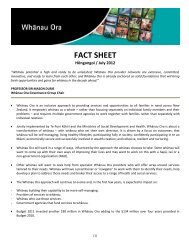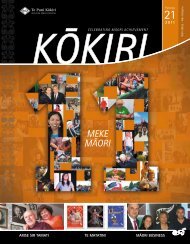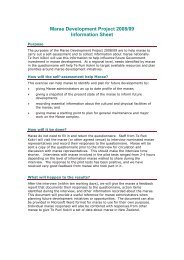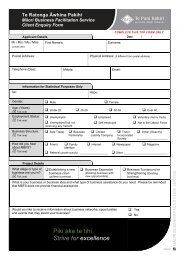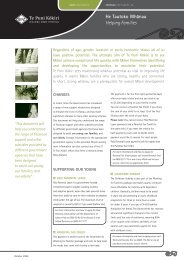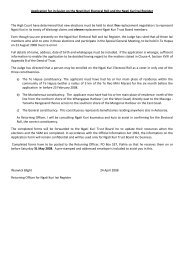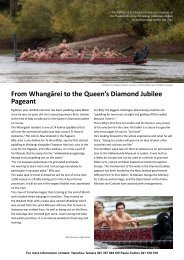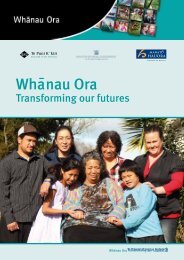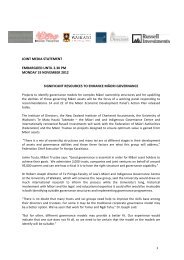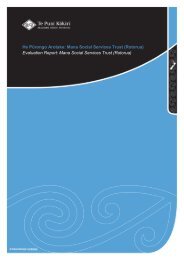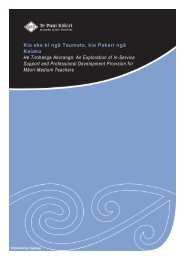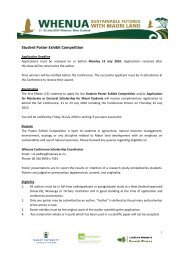Whanau Ora : Report of the Taskforce on Whanau-Centred Initiatives
Whanau Ora : Report of the Taskforce on Whanau-Centred Initiatives
Whanau Ora : Report of the Taskforce on Whanau-Centred Initiatives
You also want an ePaper? Increase the reach of your titles
YUMPU automatically turns print PDFs into web optimized ePapers that Google loves.
Whānau Inclusi<strong>on</strong> Within Society<br />
2.3.5 Social and ec<strong>on</strong>omic wellbeing are more likely to be realised when <str<strong>on</strong>g>the</str<strong>on</strong>g>re is<br />
full participati<strong>on</strong> in society. Notwithstanding <str<strong>on</strong>g>the</str<strong>on</strong>g> disproporti<strong>on</strong>ate impacts<br />
<str<strong>on</strong>g>of</str<strong>on</strong>g> material hardship <strong>on</strong> many Māori households, whānau inclusi<strong>on</strong> within<br />
wider society has increased significantly over <str<strong>on</strong>g>the</str<strong>on</strong>g> past two or three decades.<br />
Greater inclusi<strong>on</strong> is reflected in <str<strong>on</strong>g>the</str<strong>on</strong>g> current high uptake <str<strong>on</strong>g>of</str<strong>on</strong>g> early childhood<br />
educati<strong>on</strong>, dramatic increases in Māori participati<strong>on</strong> in tertiary educati<strong>on</strong>,<br />
increased access to a choice <str<strong>on</strong>g>of</str<strong>on</strong>g> health providers, a str<strong>on</strong>g Māori presence<br />
within <str<strong>on</strong>g>the</str<strong>on</strong>g> social services, increased Māori leadership in commercial and<br />
pr<str<strong>on</strong>g>of</str<strong>on</strong>g>essi<strong>on</strong>al ventures, and increased involvement in both <str<strong>on</strong>g>the</str<strong>on</strong>g> governance<br />
and management <str<strong>on</strong>g>of</str<strong>on</strong>g> public bodies such as local authorities and district<br />
health boards.<br />
2.3.6 However, full participati<strong>on</strong> in society and <str<strong>on</strong>g>the</str<strong>on</strong>g> ec<strong>on</strong>omy eludes many<br />
whānau and is reflected in higher unemployment rates especially for<br />
school leavers, as well as higher rates <str<strong>on</strong>g>of</str<strong>on</strong>g> employment in low-paying jobs.<br />
A critical determinant <str<strong>on</strong>g>of</str<strong>on</strong>g> employment and societal participati<strong>on</strong> is<br />
educati<strong>on</strong>al success, but Māori educati<strong>on</strong>al outcomes at sec<strong>on</strong>dary school<br />
level are disappointingly low, particularly for Māori boys. The impacts <str<strong>on</strong>g>of</str<strong>on</strong>g><br />
poor educati<strong>on</strong>al achievement are multiple and include overrepresentati<strong>on</strong><br />
in <str<strong>on</strong>g>the</str<strong>on</strong>g> criminal justice system. Whānau benefits from n<strong>on</strong>-compulsory<br />
educati<strong>on</strong> at pre-school and tertiary levels have yet to be felt in <str<strong>on</strong>g>the</str<strong>on</strong>g><br />
compulsory sub-sector (primary and sec<strong>on</strong>dary schooling).<br />
2.3.7 However, a number <str<strong>on</strong>g>of</str<strong>on</strong>g> initiatives have been able to dem<strong>on</strong>strate how<br />
educati<strong>on</strong>al under-performance can be transformed into success.<br />
Many <str<strong>on</strong>g>of</str<strong>on</strong>g> <str<strong>on</strong>g>the</str<strong>on</strong>g>se initiatives depend <strong>on</strong> creating educati<strong>on</strong>al envir<strong>on</strong>ments<br />
with appropriate cultural alignments (such as whare kura) or niche learning<br />
opportunities (such as <str<strong>on</strong>g>the</str<strong>on</strong>g> Māori boarding schools). Through <str<strong>on</strong>g>the</str<strong>on</strong>g>ir own<br />
innovative practices, some large state schools have enjoyed c<strong>on</strong>siderable<br />
success for senior Māori students. In all cases <str<strong>on</strong>g>the</str<strong>on</strong>g> active involvement <str<strong>on</strong>g>of</str<strong>on</strong>g><br />
whānau in <str<strong>on</strong>g>the</str<strong>on</strong>g> educati<strong>on</strong>al process has been recognised as a significant<br />
comp<strong>on</strong>ent <str<strong>on</strong>g>of</str<strong>on</strong>g> successful educati<strong>on</strong>al outcomes.<br />
We believe that commitment<br />
to Whānau <str<strong>on</strong>g>Ora</str<strong>on</strong>g> in this way<br />
achieves Māori expectati<strong>on</strong>s<br />
for services which better<br />
reflect te Tiriti o Waitangi<br />
al<strong>on</strong>gside <str<strong>on</strong>g>the</str<strong>on</strong>g> promises<br />
made.<br />
Culture is at <str<strong>on</strong>g>the</str<strong>on</strong>g> centre <str<strong>on</strong>g>of</str<strong>on</strong>g><br />
wellbeing to Māori – it is<br />
about caring, sharing, and<br />
looking after each o<str<strong>on</strong>g>the</str<strong>on</strong>g>r.<br />
Whānau Participati<strong>on</strong> in Te Ao Māori<br />
2.3.8 While full participati<strong>on</strong> in wider society is essential for whānau welfare,<br />
active participati<strong>on</strong> in Māori communities and networks is also an important<br />
determinant <str<strong>on</strong>g>of</str<strong>on</strong>g> wellbeing. Despite urbanisati<strong>on</strong>, over <str<strong>on</strong>g>the</str<strong>on</strong>g> past two decades<br />
<str<strong>on</strong>g>the</str<strong>on</strong>g>re has been increased whānau access to Māori culture, Māori networks,<br />
marae and tribal endeavours. An important enabling instrument has<br />
been <str<strong>on</strong>g>the</str<strong>on</strong>g> Treaty <str<strong>on</strong>g>of</str<strong>on</strong>g> Waitangi. The recogniti<strong>on</strong> <str<strong>on</strong>g>of</str<strong>on</strong>g> <str<strong>on</strong>g>the</str<strong>on</strong>g> significance <str<strong>on</strong>g>of</str<strong>on</strong>g> <str<strong>on</strong>g>the</str<strong>on</strong>g><br />
Treaty to social as well as ec<strong>on</strong>omic policies was highlighted by <str<strong>on</strong>g>the</str<strong>on</strong>g> Royal<br />
Commissi<strong>on</strong> <strong>on</strong> Social Policy in 1988 and a Treaty-based cultural dimensi<strong>on</strong><br />
to wellbeing was subsequently acknowledged by <str<strong>on</strong>g>the</str<strong>on</strong>g> Crown in regard to<br />
Māori language, Māori educati<strong>on</strong>, and service delivery to Māori.<br />
The statements placed to <str<strong>on</strong>g>the</str<strong>on</strong>g> side <str<strong>on</strong>g>of</str<strong>on</strong>g> <str<strong>on</strong>g>the</str<strong>on</strong>g> text throughout <str<strong>on</strong>g>the</str<strong>on</strong>g> report are taken directly from<br />
<str<strong>on</strong>g>the</str<strong>on</strong>g> feedback (written and oral) <str<strong>on</strong>g>of</str<strong>on</strong>g> <str<strong>on</strong>g>the</str<strong>on</strong>g> many individuals and organisati<strong>on</strong>s who participated<br />
in <str<strong>on</strong>g>the</str<strong>on</strong>g> engagement process.<br />
16



